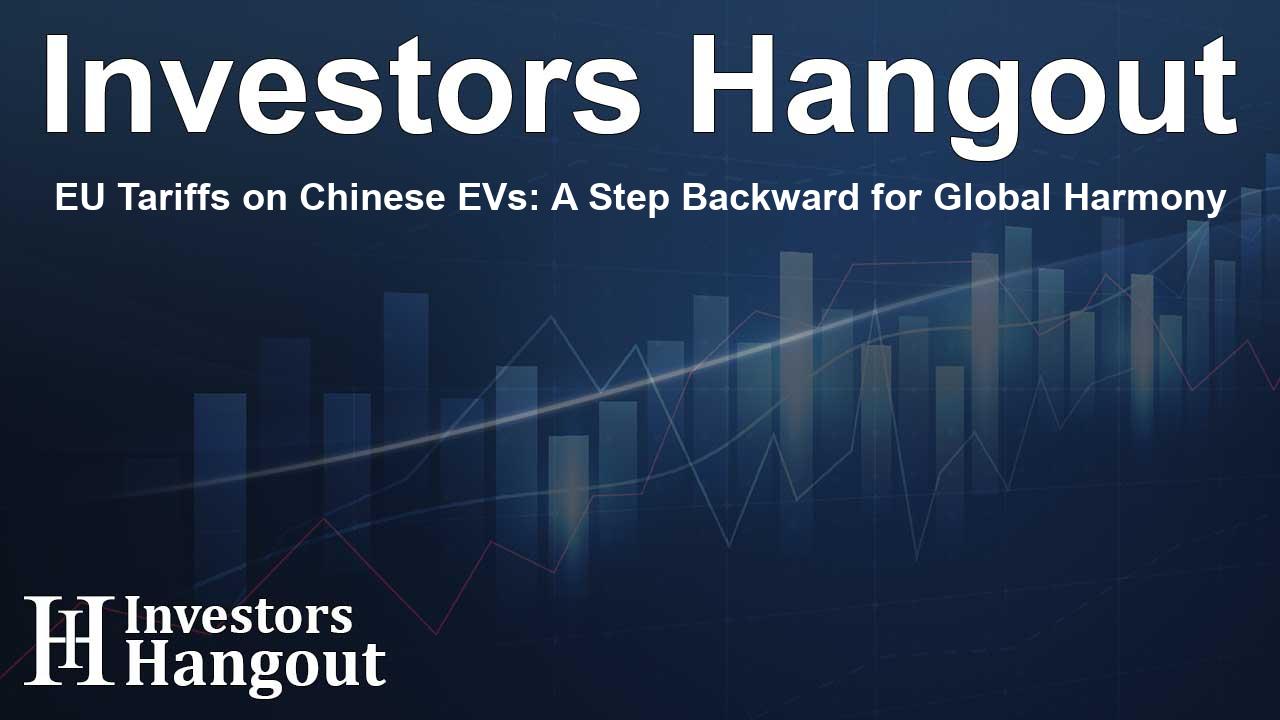EU Tariffs on Chinese EVs: A Step Backward for Global Harmony

Impact of EU Tariffs on Chinese Electric Vehicles
The recent decision by the European Commission to implement tariffs on electric vehicles (EVs) manufactured in China has raised concerns about its repercussions on international relations and environmental efforts. This decision, as reported by various outlets, is viewed as detrimental to the long-standing collaborative relationship between the European Union (EU) and China, potentially jeopardizing collective climate objectives.
Nature of the Trade Dispute
Details of the Proposed Tariffs
Despite significant opposition, particularly from Germany, the EU has chosen to advance with stringent tariffs on Chinese EVs. This move marks a critical moment in international trade relations, representing the largest trade dispute with Beijing in the last decade.
Responses from Chinese Authorities
Chinese officials have strongly criticized the EU's proposed tariffs, labeling them unfair and unreasonable. The Chinese Commerce Ministry has vowed to challenge these tariffs at the World Trade Organization, highlighting the growing tensions in trade relationships between major economies.
Consequences for Cooperation and Climate Goals
According to analysts, this protectionist approach could hinder what the EU has aimed to achieve in terms of green energy transitions. By imposing duties of up to 45% on Chinese EVs, the effort is likely to not only strain relations with China but also could undermine the goals set forth by European nations aiming for an eco-friendly future.
Concerns of Domestic Producers
Implications for European EV Manufacturers
European manufacturers have raised alarms regarding the influx of affordable Chinese EVs, fearing that they might face significant financial repercussions. These worries stem from the anticipated cost increases due to the tariffs, which could result in billions of additional expenses for carmakers looking to import vehicles into the EU market.
The Importance of Negotiation
Many argue that instead of imposing tariffs, it is vital for the EU to seek compromise through negotiation with China. The imposition of tariffs could escalate trade conflicts that may not only affect bilateral relations but also the broader ambitions surrounding climate action and sustainability initiatives.
Retaliatory Measures and Broader Trade Dynamics
In the wake of this trade spat, China has reportedly initiated investigations into the imports of European products, such as brandy and dairy, signaling a potential retaliatory stance. Such actions may further complicate the trading environment and suggest a continued escalation of tension.
Global Trade Landscape: A Challenging Path Ahead
The current global landscape is shaped by intricate trade relationships, and the EU's choice to impose tariffs on Chinese-made vehicles is a significant element in this evolving puzzle. The resulting tensions could negate the progress made in recent years toward enhancing international cooperation and fostering mutual understanding.
Conclusion
The EU's strategy on Chinese EV tariffs is more than just a trade measure; it is a pivotal moment that could redefine international relations and environmental policy. Stakeholders on all sides will need to navigate these complexities carefully to pave the way for a balanced approach that respects both economic growth and climate commitments.
Frequently Asked Questions
What are the proposed tariffs on Chinese EVs by the EU?
The EU plans to impose tariffs up to 45% on Chinese electric vehicles to address concerns over subsidies and competition.
How might these tariffs affect EU-China relations?
The imposition of tariffs could strain relations between the EU and China, moving toward a more protectionist trade environment.
What has been China's response to the EU's tariffs?
China has expressed strong opposition to the tariffs, labeling them as unfair and has decided to challenge them at the World Trade Organization.
What are the implications for European EV manufacturers?
Many domestic manufacturers fear significant financial losses due to the competitive pricing of Chinese EVs, exacerbated by the additional costs from tariffs.
Could negotiations help resolve this trade dispute?
Experts suggest that abandoning tariffs in favor of negotiations is essential to maintain cooperation and work towards shared climate goals.
About The Author
Contact Addison Perry privately here. Or send an email with ATTN: Addison Perry as the subject to contact@investorshangout.com.
About Investors Hangout
Investors Hangout is a leading online stock forum for financial discussion and learning, offering a wide range of free tools and resources. It draws in traders of all levels, who exchange market knowledge, investigate trading tactics, and keep an eye on industry developments in real time. Featuring financial articles, stock message boards, quotes, charts, company profiles, and live news updates. Through cooperative learning and a wealth of informational resources, it helps users from novices creating their first portfolios to experts honing their techniques. Join Investors Hangout today: https://investorshangout.com/
The content of this article is based on factual, publicly available information and does not represent legal, financial, or investment advice. Investors Hangout does not offer financial advice, and the author is not a licensed financial advisor. Consult a qualified advisor before making any financial or investment decisions based on this article. This article should not be considered advice to purchase, sell, or hold any securities or other investments. If any of the material provided here is inaccurate, please contact us for corrections.
